Environmental Challenges and Sustainability in the Context of Russia
VerifiedAdded on 2020/02/24
|12
|3209
|36
Report
AI Summary
This report provides a comprehensive overview of climate change's impact on Russia, examining its effects on the environment, economy, and society. It discusses the specific ways climate change is affecting Russia, including rising temperatures, melting permafrost, and increased frequency of extreme weather events. The report identifies the key stakeholders responsible for addressing these challenges, including the Russian government, businesses, and civil society. It also proposes potential solutions, such as mitigation strategies, adaptation measures, and the promotion of sustainable development practices. The report emphasizes the importance of transitioning to eco-efficient technologies, renewable energy sources, and green practices to achieve a sustainable future for Russia. It highlights the need for international cooperation and the involvement of various stakeholders in addressing climate change and fostering environmental protection.
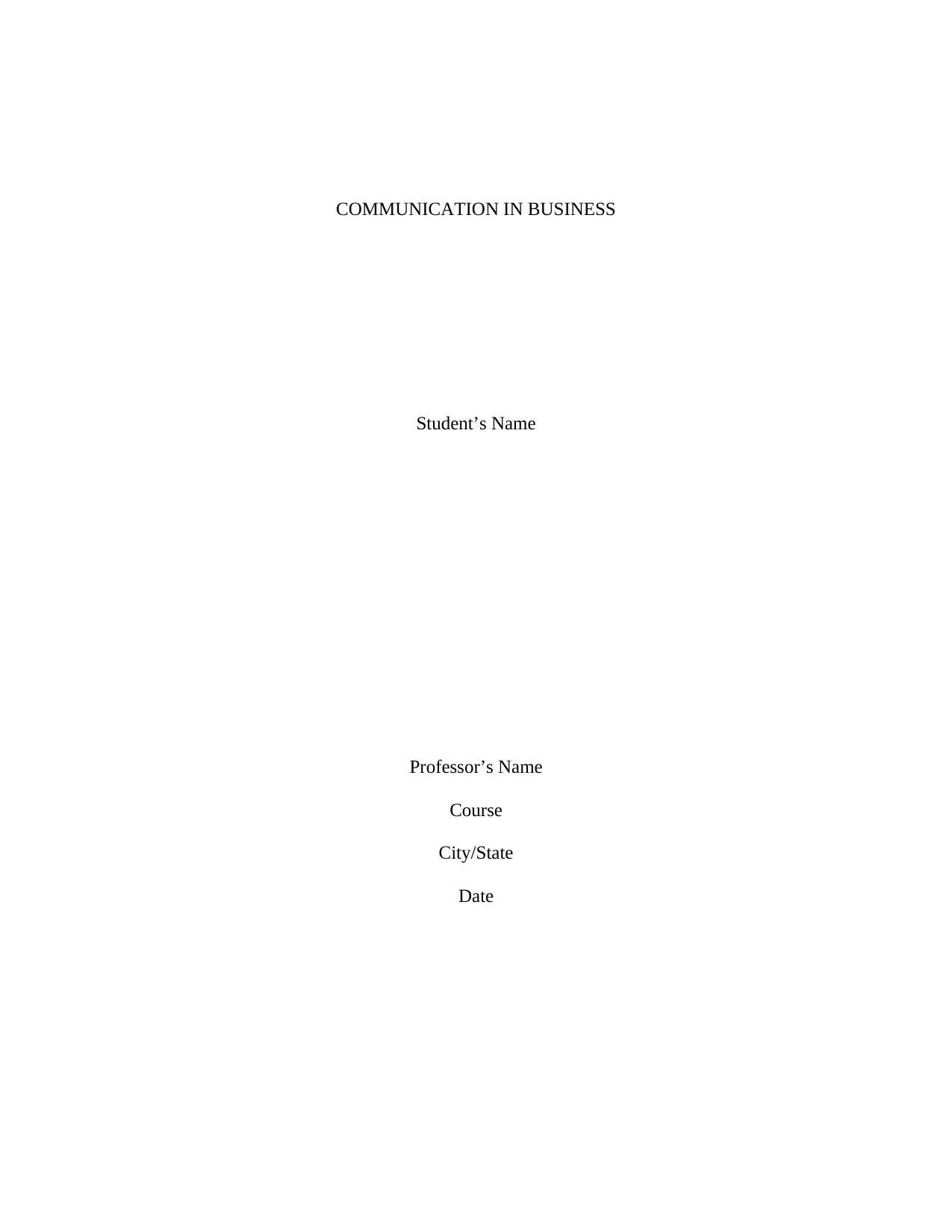
COMMUNICATION IN BUSINESS
Student’s Name
Professor’s Name
Course
City/State
Date
Student’s Name
Professor’s Name
Course
City/State
Date
Paraphrase This Document
Need a fresh take? Get an instant paraphrase of this document with our AI Paraphraser
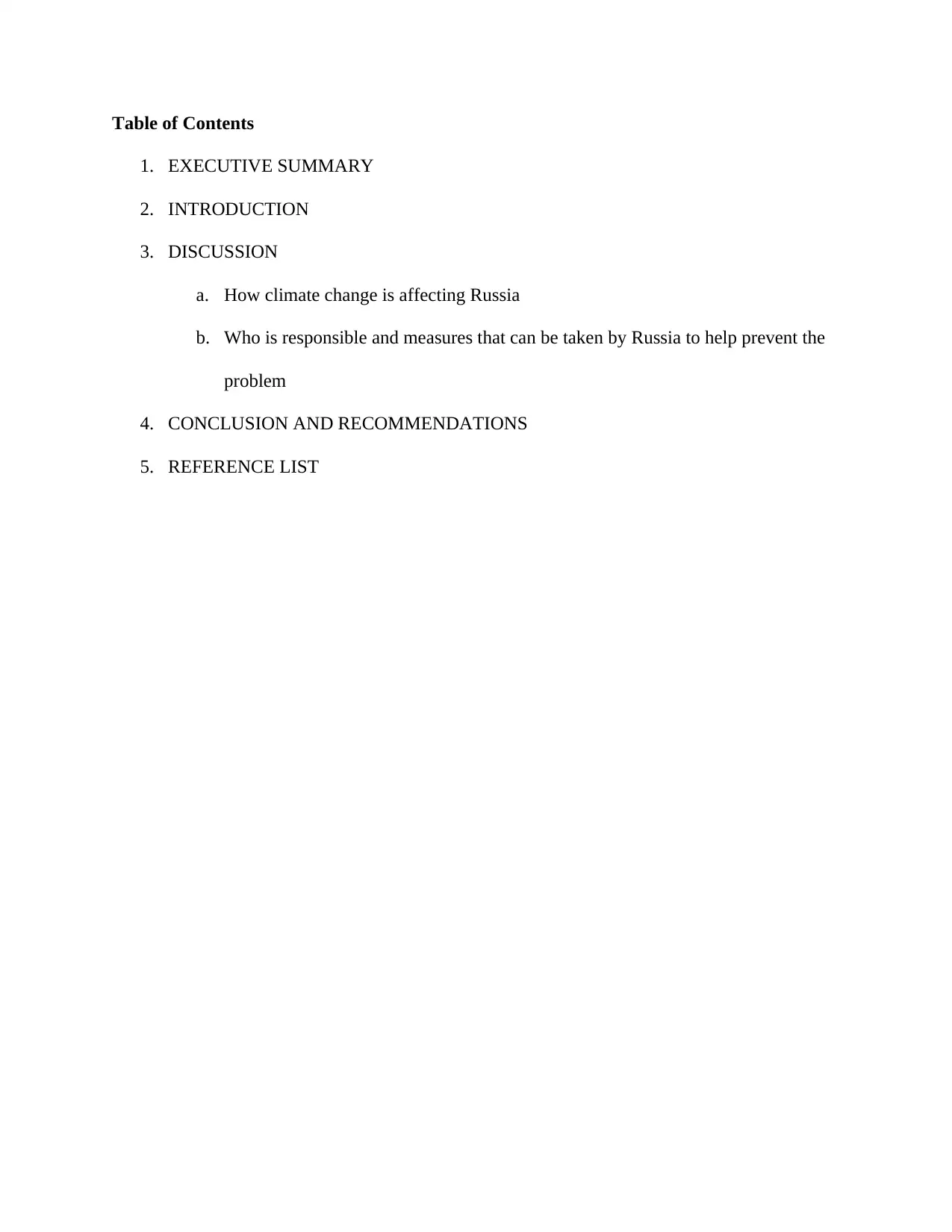
Table of Contents
1. EXECUTIVE SUMMARY
2. INTRODUCTION
3. DISCUSSION
a. How climate change is affecting Russia
b. Who is responsible and measures that can be taken by Russia to help prevent the
problem
4. CONCLUSION AND RECOMMENDATIONS
5. REFERENCE LIST
1. EXECUTIVE SUMMARY
2. INTRODUCTION
3. DISCUSSION
a. How climate change is affecting Russia
b. Who is responsible and measures that can be taken by Russia to help prevent the
problem
4. CONCLUSION AND RECOMMENDATIONS
5. REFERENCE LIST
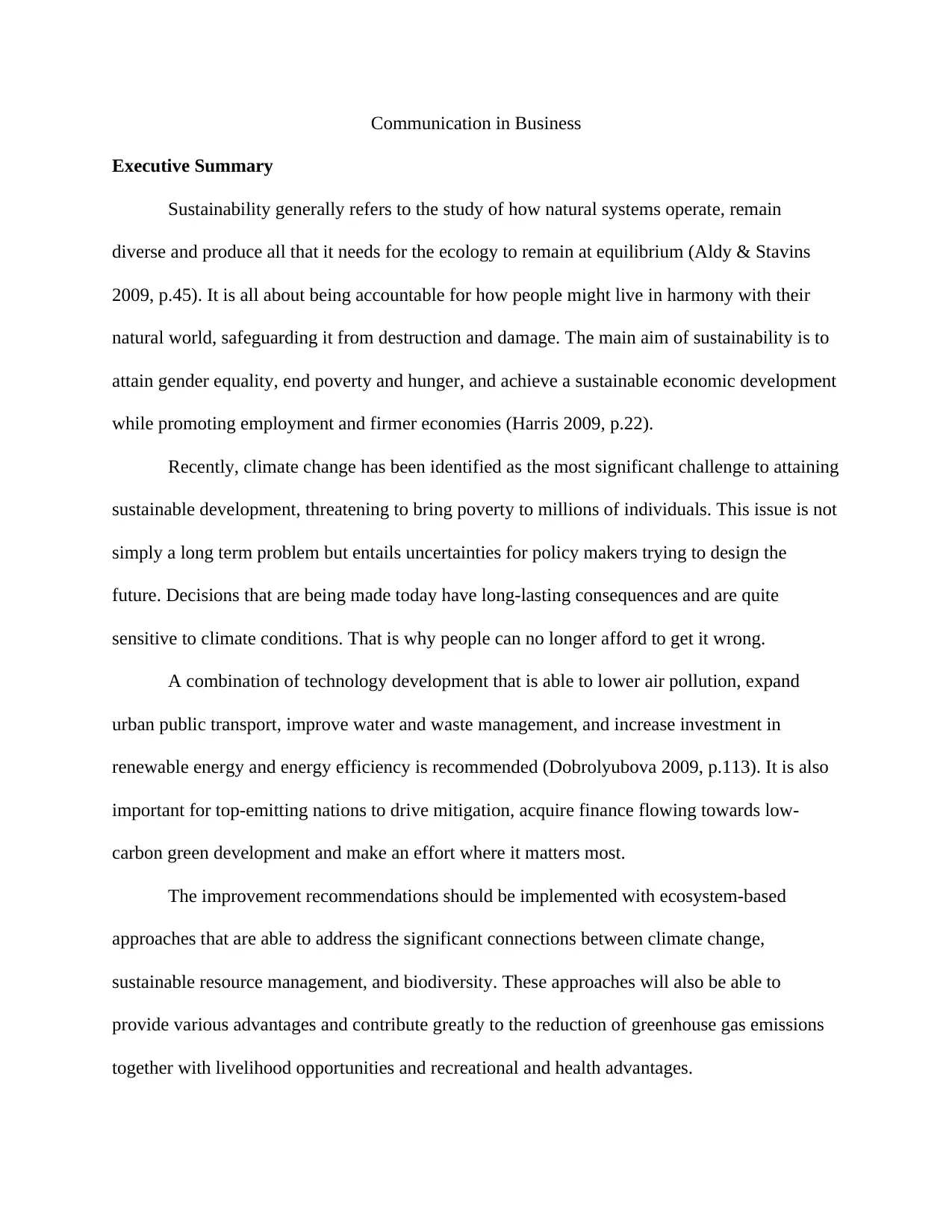
Communication in Business
Executive Summary
Sustainability generally refers to the study of how natural systems operate, remain
diverse and produce all that it needs for the ecology to remain at equilibrium (Aldy & Stavins
2009, p.45). It is all about being accountable for how people might live in harmony with their
natural world, safeguarding it from destruction and damage. The main aim of sustainability is to
attain gender equality, end poverty and hunger, and achieve a sustainable economic development
while promoting employment and firmer economies (Harris 2009, p.22).
Recently, climate change has been identified as the most significant challenge to attaining
sustainable development, threatening to bring poverty to millions of individuals. This issue is not
simply a long term problem but entails uncertainties for policy makers trying to design the
future. Decisions that are being made today have long-lasting consequences and are quite
sensitive to climate conditions. That is why people can no longer afford to get it wrong.
A combination of technology development that is able to lower air pollution, expand
urban public transport, improve water and waste management, and increase investment in
renewable energy and energy efficiency is recommended (Dobrolyubova 2009, p.113). It is also
important for top-emitting nations to drive mitigation, acquire finance flowing towards low-
carbon green development and make an effort where it matters most.
The improvement recommendations should be implemented with ecosystem-based
approaches that are able to address the significant connections between climate change,
sustainable resource management, and biodiversity. These approaches will also be able to
provide various advantages and contribute greatly to the reduction of greenhouse gas emissions
together with livelihood opportunities and recreational and health advantages.
Executive Summary
Sustainability generally refers to the study of how natural systems operate, remain
diverse and produce all that it needs for the ecology to remain at equilibrium (Aldy & Stavins
2009, p.45). It is all about being accountable for how people might live in harmony with their
natural world, safeguarding it from destruction and damage. The main aim of sustainability is to
attain gender equality, end poverty and hunger, and achieve a sustainable economic development
while promoting employment and firmer economies (Harris 2009, p.22).
Recently, climate change has been identified as the most significant challenge to attaining
sustainable development, threatening to bring poverty to millions of individuals. This issue is not
simply a long term problem but entails uncertainties for policy makers trying to design the
future. Decisions that are being made today have long-lasting consequences and are quite
sensitive to climate conditions. That is why people can no longer afford to get it wrong.
A combination of technology development that is able to lower air pollution, expand
urban public transport, improve water and waste management, and increase investment in
renewable energy and energy efficiency is recommended (Dobrolyubova 2009, p.113). It is also
important for top-emitting nations to drive mitigation, acquire finance flowing towards low-
carbon green development and make an effort where it matters most.
The improvement recommendations should be implemented with ecosystem-based
approaches that are able to address the significant connections between climate change,
sustainable resource management, and biodiversity. These approaches will also be able to
provide various advantages and contribute greatly to the reduction of greenhouse gas emissions
together with livelihood opportunities and recreational and health advantages.
⊘ This is a preview!⊘
Do you want full access?
Subscribe today to unlock all pages.

Trusted by 1+ million students worldwide
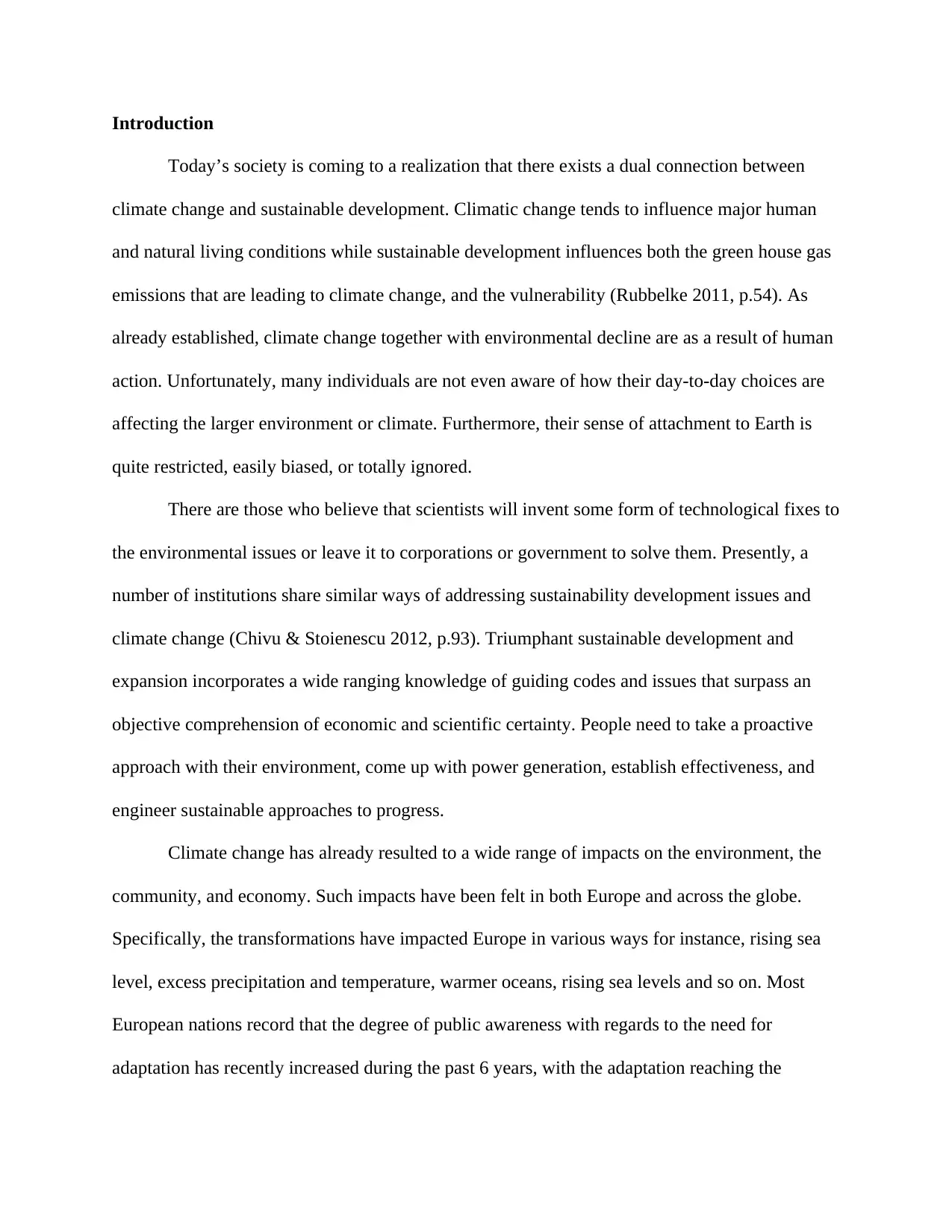
Introduction
Today’s society is coming to a realization that there exists a dual connection between
climate change and sustainable development. Climatic change tends to influence major human
and natural living conditions while sustainable development influences both the green house gas
emissions that are leading to climate change, and the vulnerability (Rubbelke 2011, p.54). As
already established, climate change together with environmental decline are as a result of human
action. Unfortunately, many individuals are not even aware of how their day-to-day choices are
affecting the larger environment or climate. Furthermore, their sense of attachment to Earth is
quite restricted, easily biased, or totally ignored.
There are those who believe that scientists will invent some form of technological fixes to
the environmental issues or leave it to corporations or government to solve them. Presently, a
number of institutions share similar ways of addressing sustainability development issues and
climate change (Chivu & Stoienescu 2012, p.93). Triumphant sustainable development and
expansion incorporates a wide ranging knowledge of guiding codes and issues that surpass an
objective comprehension of economic and scientific certainty. People need to take a proactive
approach with their environment, come up with power generation, establish effectiveness, and
engineer sustainable approaches to progress.
Climate change has already resulted to a wide range of impacts on the environment, the
community, and economy. Such impacts have been felt in both Europe and across the globe.
Specifically, the transformations have impacted Europe in various ways for instance, rising sea
level, excess precipitation and temperature, warmer oceans, rising sea levels and so on. Most
European nations record that the degree of public awareness with regards to the need for
adaptation has recently increased during the past 6 years, with the adaptation reaching the
Today’s society is coming to a realization that there exists a dual connection between
climate change and sustainable development. Climatic change tends to influence major human
and natural living conditions while sustainable development influences both the green house gas
emissions that are leading to climate change, and the vulnerability (Rubbelke 2011, p.54). As
already established, climate change together with environmental decline are as a result of human
action. Unfortunately, many individuals are not even aware of how their day-to-day choices are
affecting the larger environment or climate. Furthermore, their sense of attachment to Earth is
quite restricted, easily biased, or totally ignored.
There are those who believe that scientists will invent some form of technological fixes to
the environmental issues or leave it to corporations or government to solve them. Presently, a
number of institutions share similar ways of addressing sustainability development issues and
climate change (Chivu & Stoienescu 2012, p.93). Triumphant sustainable development and
expansion incorporates a wide ranging knowledge of guiding codes and issues that surpass an
objective comprehension of economic and scientific certainty. People need to take a proactive
approach with their environment, come up with power generation, establish effectiveness, and
engineer sustainable approaches to progress.
Climate change has already resulted to a wide range of impacts on the environment, the
community, and economy. Such impacts have been felt in both Europe and across the globe.
Specifically, the transformations have impacted Europe in various ways for instance, rising sea
level, excess precipitation and temperature, warmer oceans, rising sea levels and so on. Most
European nations record that the degree of public awareness with regards to the need for
adaptation has recently increased during the past 6 years, with the adaptation reaching the
Paraphrase This Document
Need a fresh take? Get an instant paraphrase of this document with our AI Paraphraser
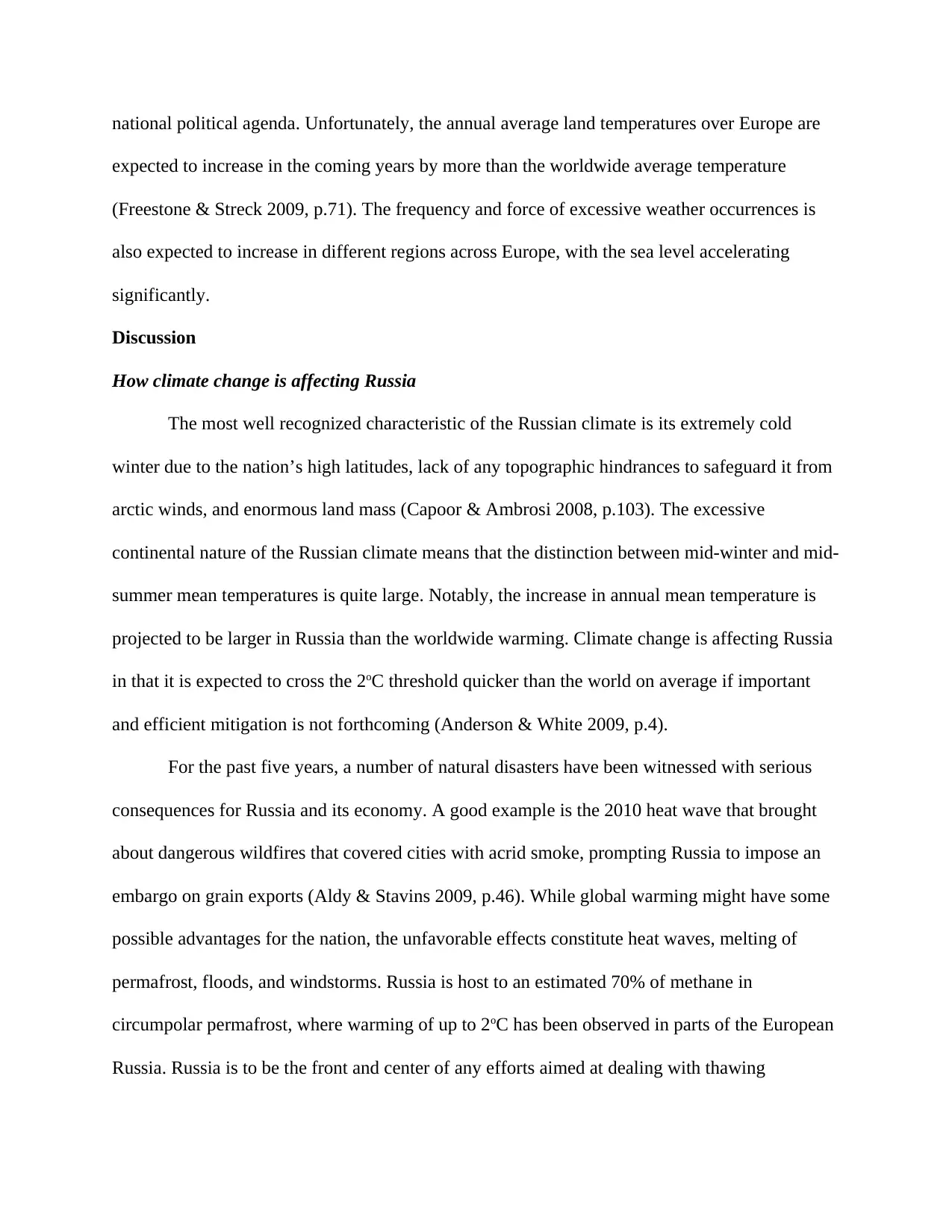
national political agenda. Unfortunately, the annual average land temperatures over Europe are
expected to increase in the coming years by more than the worldwide average temperature
(Freestone & Streck 2009, p.71). The frequency and force of excessive weather occurrences is
also expected to increase in different regions across Europe, with the sea level accelerating
significantly.
Discussion
How climate change is affecting Russia
The most well recognized characteristic of the Russian climate is its extremely cold
winter due to the nation’s high latitudes, lack of any topographic hindrances to safeguard it from
arctic winds, and enormous land mass (Capoor & Ambrosi 2008, p.103). The excessive
continental nature of the Russian climate means that the distinction between mid-winter and mid-
summer mean temperatures is quite large. Notably, the increase in annual mean temperature is
projected to be larger in Russia than the worldwide warming. Climate change is affecting Russia
in that it is expected to cross the 2oC threshold quicker than the world on average if important
and efficient mitigation is not forthcoming (Anderson & White 2009, p.4).
For the past five years, a number of natural disasters have been witnessed with serious
consequences for Russia and its economy. A good example is the 2010 heat wave that brought
about dangerous wildfires that covered cities with acrid smoke, prompting Russia to impose an
embargo on grain exports (Aldy & Stavins 2009, p.46). While global warming might have some
possible advantages for the nation, the unfavorable effects constitute heat waves, melting of
permafrost, floods, and windstorms. Russia is host to an estimated 70% of methane in
circumpolar permafrost, where warming of up to 2oC has been observed in parts of the European
Russia. Russia is to be the front and center of any efforts aimed at dealing with thawing
expected to increase in the coming years by more than the worldwide average temperature
(Freestone & Streck 2009, p.71). The frequency and force of excessive weather occurrences is
also expected to increase in different regions across Europe, with the sea level accelerating
significantly.
Discussion
How climate change is affecting Russia
The most well recognized characteristic of the Russian climate is its extremely cold
winter due to the nation’s high latitudes, lack of any topographic hindrances to safeguard it from
arctic winds, and enormous land mass (Capoor & Ambrosi 2008, p.103). The excessive
continental nature of the Russian climate means that the distinction between mid-winter and mid-
summer mean temperatures is quite large. Notably, the increase in annual mean temperature is
projected to be larger in Russia than the worldwide warming. Climate change is affecting Russia
in that it is expected to cross the 2oC threshold quicker than the world on average if important
and efficient mitigation is not forthcoming (Anderson & White 2009, p.4).
For the past five years, a number of natural disasters have been witnessed with serious
consequences for Russia and its economy. A good example is the 2010 heat wave that brought
about dangerous wildfires that covered cities with acrid smoke, prompting Russia to impose an
embargo on grain exports (Aldy & Stavins 2009, p.46). While global warming might have some
possible advantages for the nation, the unfavorable effects constitute heat waves, melting of
permafrost, floods, and windstorms. Russia is host to an estimated 70% of methane in
circumpolar permafrost, where warming of up to 2oC has been observed in parts of the European
Russia. Russia is to be the front and center of any efforts aimed at dealing with thawing
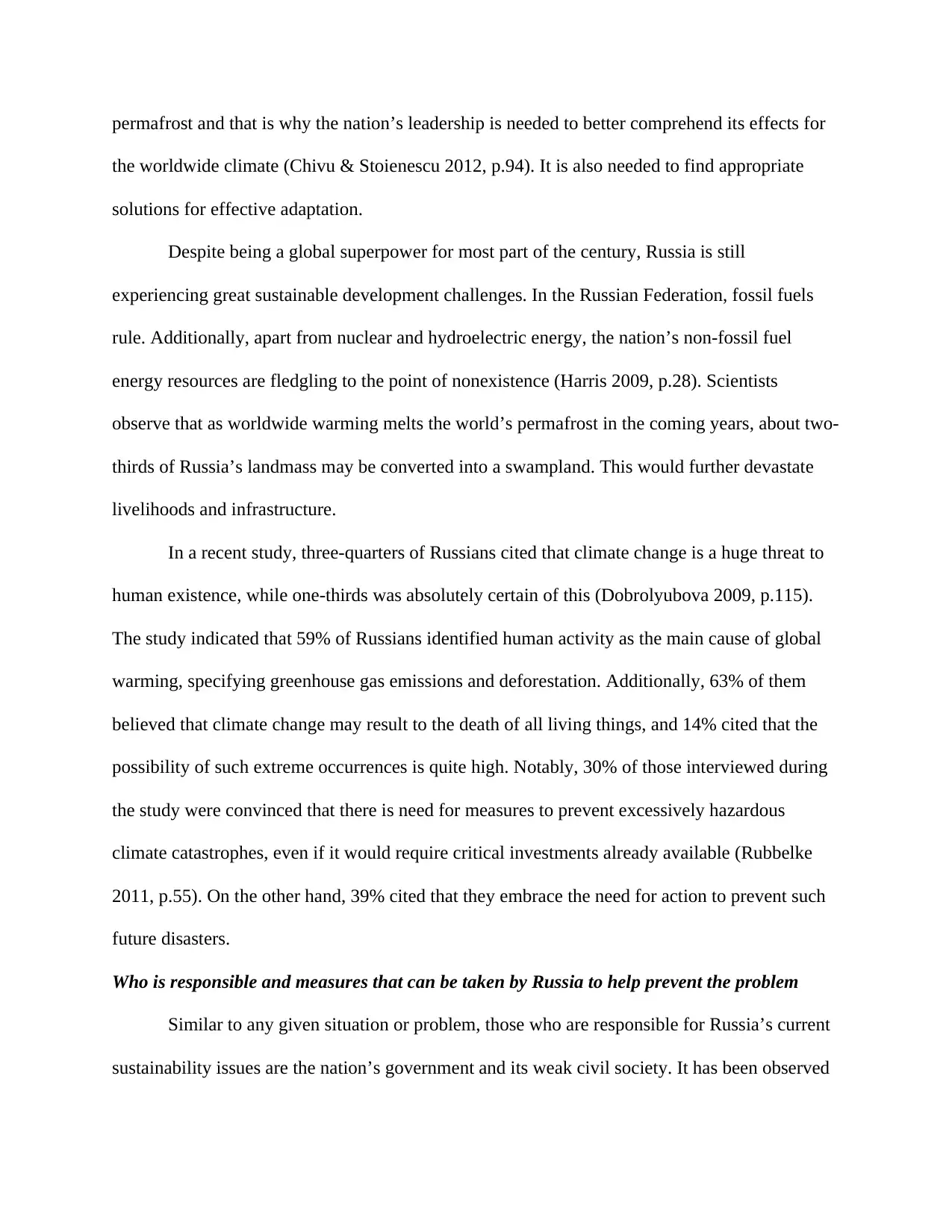
permafrost and that is why the nation’s leadership is needed to better comprehend its effects for
the worldwide climate (Chivu & Stoienescu 2012, p.94). It is also needed to find appropriate
solutions for effective adaptation.
Despite being a global superpower for most part of the century, Russia is still
experiencing great sustainable development challenges. In the Russian Federation, fossil fuels
rule. Additionally, apart from nuclear and hydroelectric energy, the nation’s non-fossil fuel
energy resources are fledgling to the point of nonexistence (Harris 2009, p.28). Scientists
observe that as worldwide warming melts the world’s permafrost in the coming years, about two-
thirds of Russia’s landmass may be converted into a swampland. This would further devastate
livelihoods and infrastructure.
In a recent study, three-quarters of Russians cited that climate change is a huge threat to
human existence, while one-thirds was absolutely certain of this (Dobrolyubova 2009, p.115).
The study indicated that 59% of Russians identified human activity as the main cause of global
warming, specifying greenhouse gas emissions and deforestation. Additionally, 63% of them
believed that climate change may result to the death of all living things, and 14% cited that the
possibility of such extreme occurrences is quite high. Notably, 30% of those interviewed during
the study were convinced that there is need for measures to prevent excessively hazardous
climate catastrophes, even if it would require critical investments already available (Rubbelke
2011, p.55). On the other hand, 39% cited that they embrace the need for action to prevent such
future disasters.
Who is responsible and measures that can be taken by Russia to help prevent the problem
Similar to any given situation or problem, those who are responsible for Russia’s current
sustainability issues are the nation’s government and its weak civil society. It has been observed
the worldwide climate (Chivu & Stoienescu 2012, p.94). It is also needed to find appropriate
solutions for effective adaptation.
Despite being a global superpower for most part of the century, Russia is still
experiencing great sustainable development challenges. In the Russian Federation, fossil fuels
rule. Additionally, apart from nuclear and hydroelectric energy, the nation’s non-fossil fuel
energy resources are fledgling to the point of nonexistence (Harris 2009, p.28). Scientists
observe that as worldwide warming melts the world’s permafrost in the coming years, about two-
thirds of Russia’s landmass may be converted into a swampland. This would further devastate
livelihoods and infrastructure.
In a recent study, three-quarters of Russians cited that climate change is a huge threat to
human existence, while one-thirds was absolutely certain of this (Dobrolyubova 2009, p.115).
The study indicated that 59% of Russians identified human activity as the main cause of global
warming, specifying greenhouse gas emissions and deforestation. Additionally, 63% of them
believed that climate change may result to the death of all living things, and 14% cited that the
possibility of such extreme occurrences is quite high. Notably, 30% of those interviewed during
the study were convinced that there is need for measures to prevent excessively hazardous
climate catastrophes, even if it would require critical investments already available (Rubbelke
2011, p.55). On the other hand, 39% cited that they embrace the need for action to prevent such
future disasters.
Who is responsible and measures that can be taken by Russia to help prevent the problem
Similar to any given situation or problem, those who are responsible for Russia’s current
sustainability issues are the nation’s government and its weak civil society. It has been observed
⊘ This is a preview!⊘
Do you want full access?
Subscribe today to unlock all pages.

Trusted by 1+ million students worldwide
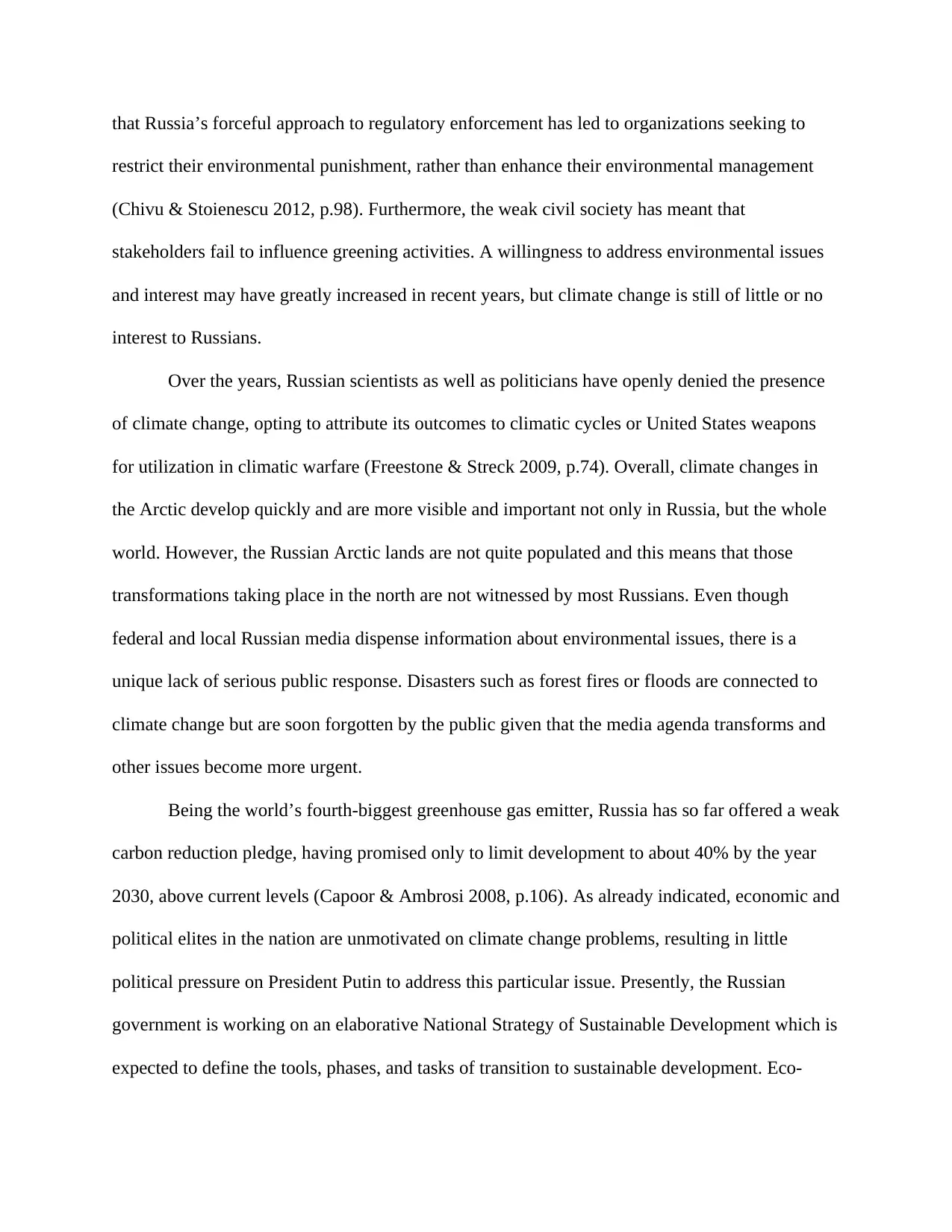
that Russia’s forceful approach to regulatory enforcement has led to organizations seeking to
restrict their environmental punishment, rather than enhance their environmental management
(Chivu & Stoienescu 2012, p.98). Furthermore, the weak civil society has meant that
stakeholders fail to influence greening activities. A willingness to address environmental issues
and interest may have greatly increased in recent years, but climate change is still of little or no
interest to Russians.
Over the years, Russian scientists as well as politicians have openly denied the presence
of climate change, opting to attribute its outcomes to climatic cycles or United States weapons
for utilization in climatic warfare (Freestone & Streck 2009, p.74). Overall, climate changes in
the Arctic develop quickly and are more visible and important not only in Russia, but the whole
world. However, the Russian Arctic lands are not quite populated and this means that those
transformations taking place in the north are not witnessed by most Russians. Even though
federal and local Russian media dispense information about environmental issues, there is a
unique lack of serious public response. Disasters such as forest fires or floods are connected to
climate change but are soon forgotten by the public given that the media agenda transforms and
other issues become more urgent.
Being the world’s fourth-biggest greenhouse gas emitter, Russia has so far offered a weak
carbon reduction pledge, having promised only to limit development to about 40% by the year
2030, above current levels (Capoor & Ambrosi 2008, p.106). As already indicated, economic and
political elites in the nation are unmotivated on climate change problems, resulting in little
political pressure on President Putin to address this particular issue. Presently, the Russian
government is working on an elaborative National Strategy of Sustainable Development which is
expected to define the tools, phases, and tasks of transition to sustainable development. Eco-
restrict their environmental punishment, rather than enhance their environmental management
(Chivu & Stoienescu 2012, p.98). Furthermore, the weak civil society has meant that
stakeholders fail to influence greening activities. A willingness to address environmental issues
and interest may have greatly increased in recent years, but climate change is still of little or no
interest to Russians.
Over the years, Russian scientists as well as politicians have openly denied the presence
of climate change, opting to attribute its outcomes to climatic cycles or United States weapons
for utilization in climatic warfare (Freestone & Streck 2009, p.74). Overall, climate changes in
the Arctic develop quickly and are more visible and important not only in Russia, but the whole
world. However, the Russian Arctic lands are not quite populated and this means that those
transformations taking place in the north are not witnessed by most Russians. Even though
federal and local Russian media dispense information about environmental issues, there is a
unique lack of serious public response. Disasters such as forest fires or floods are connected to
climate change but are soon forgotten by the public given that the media agenda transforms and
other issues become more urgent.
Being the world’s fourth-biggest greenhouse gas emitter, Russia has so far offered a weak
carbon reduction pledge, having promised only to limit development to about 40% by the year
2030, above current levels (Capoor & Ambrosi 2008, p.106). As already indicated, economic and
political elites in the nation are unmotivated on climate change problems, resulting in little
political pressure on President Putin to address this particular issue. Presently, the Russian
government is working on an elaborative National Strategy of Sustainable Development which is
expected to define the tools, phases, and tasks of transition to sustainable development. Eco-
Paraphrase This Document
Need a fresh take? Get an instant paraphrase of this document with our AI Paraphraser
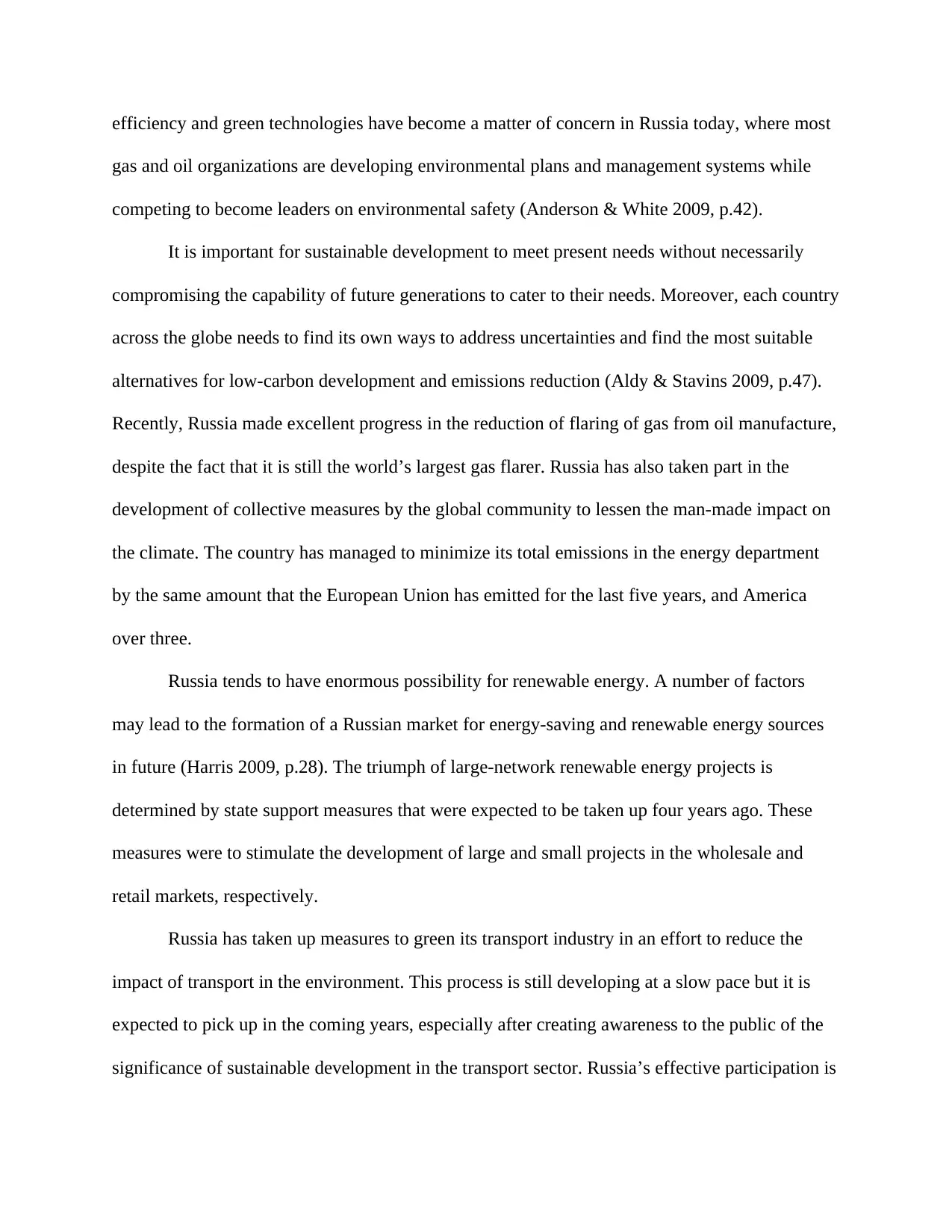
efficiency and green technologies have become a matter of concern in Russia today, where most
gas and oil organizations are developing environmental plans and management systems while
competing to become leaders on environmental safety (Anderson & White 2009, p.42).
It is important for sustainable development to meet present needs without necessarily
compromising the capability of future generations to cater to their needs. Moreover, each country
across the globe needs to find its own ways to address uncertainties and find the most suitable
alternatives for low-carbon development and emissions reduction (Aldy & Stavins 2009, p.47).
Recently, Russia made excellent progress in the reduction of flaring of gas from oil manufacture,
despite the fact that it is still the world’s largest gas flarer. Russia has also taken part in the
development of collective measures by the global community to lessen the man-made impact on
the climate. The country has managed to minimize its total emissions in the energy department
by the same amount that the European Union has emitted for the last five years, and America
over three.
Russia tends to have enormous possibility for renewable energy. A number of factors
may lead to the formation of a Russian market for energy-saving and renewable energy sources
in future (Harris 2009, p.28). The triumph of large-network renewable energy projects is
determined by state support measures that were expected to be taken up four years ago. These
measures were to stimulate the development of large and small projects in the wholesale and
retail markets, respectively.
Russia has taken up measures to green its transport industry in an effort to reduce the
impact of transport in the environment. This process is still developing at a slow pace but it is
expected to pick up in the coming years, especially after creating awareness to the public of the
significance of sustainable development in the transport sector. Russia’s effective participation is
gas and oil organizations are developing environmental plans and management systems while
competing to become leaders on environmental safety (Anderson & White 2009, p.42).
It is important for sustainable development to meet present needs without necessarily
compromising the capability of future generations to cater to their needs. Moreover, each country
across the globe needs to find its own ways to address uncertainties and find the most suitable
alternatives for low-carbon development and emissions reduction (Aldy & Stavins 2009, p.47).
Recently, Russia made excellent progress in the reduction of flaring of gas from oil manufacture,
despite the fact that it is still the world’s largest gas flarer. Russia has also taken part in the
development of collective measures by the global community to lessen the man-made impact on
the climate. The country has managed to minimize its total emissions in the energy department
by the same amount that the European Union has emitted for the last five years, and America
over three.
Russia tends to have enormous possibility for renewable energy. A number of factors
may lead to the formation of a Russian market for energy-saving and renewable energy sources
in future (Harris 2009, p.28). The triumph of large-network renewable energy projects is
determined by state support measures that were expected to be taken up four years ago. These
measures were to stimulate the development of large and small projects in the wholesale and
retail markets, respectively.
Russia has taken up measures to green its transport industry in an effort to reduce the
impact of transport in the environment. This process is still developing at a slow pace but it is
expected to pick up in the coming years, especially after creating awareness to the public of the
significance of sustainable development in the transport sector. Russia’s effective participation is
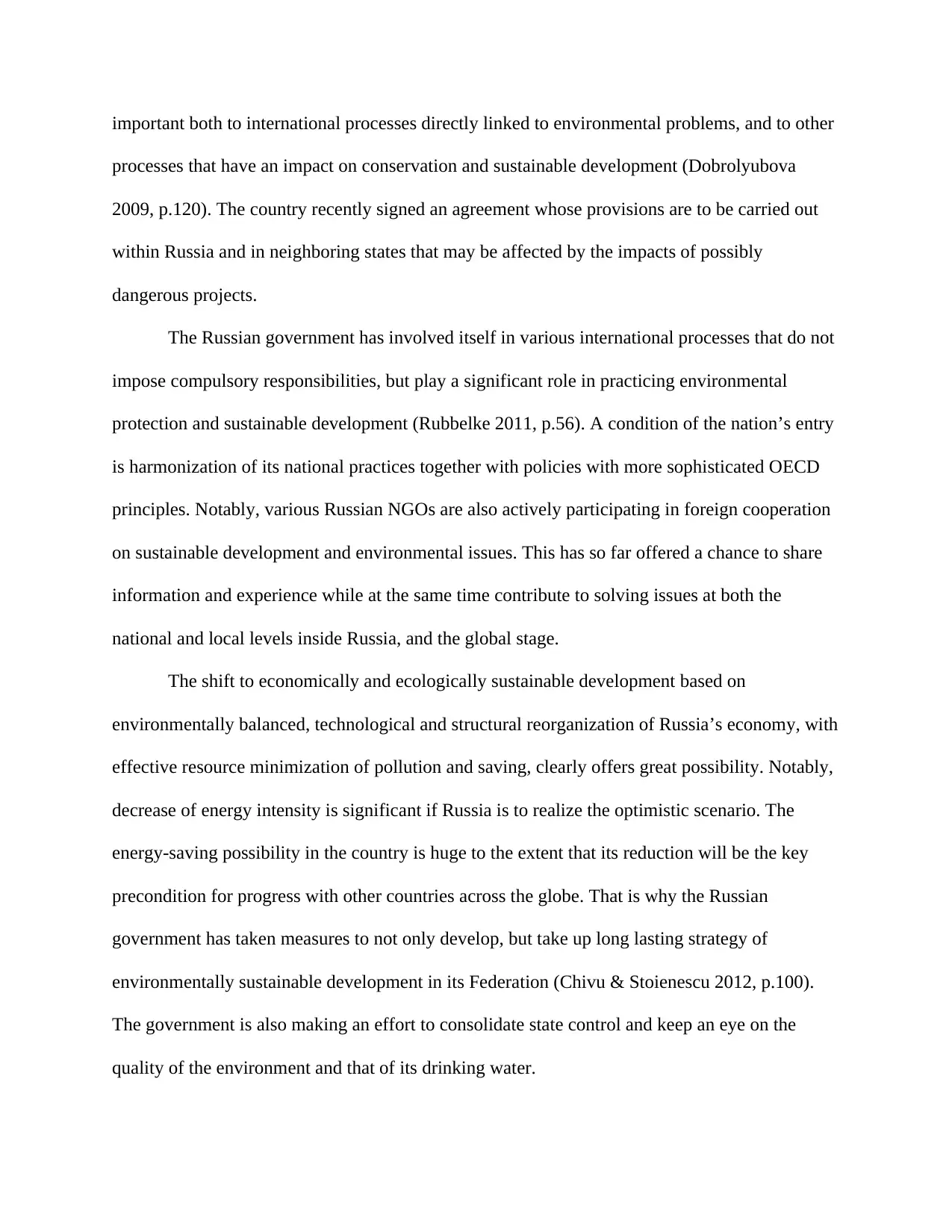
important both to international processes directly linked to environmental problems, and to other
processes that have an impact on conservation and sustainable development (Dobrolyubova
2009, p.120). The country recently signed an agreement whose provisions are to be carried out
within Russia and in neighboring states that may be affected by the impacts of possibly
dangerous projects.
The Russian government has involved itself in various international processes that do not
impose compulsory responsibilities, but play a significant role in practicing environmental
protection and sustainable development (Rubbelke 2011, p.56). A condition of the nation’s entry
is harmonization of its national practices together with policies with more sophisticated OECD
principles. Notably, various Russian NGOs are also actively participating in foreign cooperation
on sustainable development and environmental issues. This has so far offered a chance to share
information and experience while at the same time contribute to solving issues at both the
national and local levels inside Russia, and the global stage.
The shift to economically and ecologically sustainable development based on
environmentally balanced, technological and structural reorganization of Russia’s economy, with
effective resource minimization of pollution and saving, clearly offers great possibility. Notably,
decrease of energy intensity is significant if Russia is to realize the optimistic scenario. The
energy-saving possibility in the country is huge to the extent that its reduction will be the key
precondition for progress with other countries across the globe. That is why the Russian
government has taken measures to not only develop, but take up long lasting strategy of
environmentally sustainable development in its Federation (Chivu & Stoienescu 2012, p.100).
The government is also making an effort to consolidate state control and keep an eye on the
quality of the environment and that of its drinking water.
processes that have an impact on conservation and sustainable development (Dobrolyubova
2009, p.120). The country recently signed an agreement whose provisions are to be carried out
within Russia and in neighboring states that may be affected by the impacts of possibly
dangerous projects.
The Russian government has involved itself in various international processes that do not
impose compulsory responsibilities, but play a significant role in practicing environmental
protection and sustainable development (Rubbelke 2011, p.56). A condition of the nation’s entry
is harmonization of its national practices together with policies with more sophisticated OECD
principles. Notably, various Russian NGOs are also actively participating in foreign cooperation
on sustainable development and environmental issues. This has so far offered a chance to share
information and experience while at the same time contribute to solving issues at both the
national and local levels inside Russia, and the global stage.
The shift to economically and ecologically sustainable development based on
environmentally balanced, technological and structural reorganization of Russia’s economy, with
effective resource minimization of pollution and saving, clearly offers great possibility. Notably,
decrease of energy intensity is significant if Russia is to realize the optimistic scenario. The
energy-saving possibility in the country is huge to the extent that its reduction will be the key
precondition for progress with other countries across the globe. That is why the Russian
government has taken measures to not only develop, but take up long lasting strategy of
environmentally sustainable development in its Federation (Chivu & Stoienescu 2012, p.100).
The government is also making an effort to consolidate state control and keep an eye on the
quality of the environment and that of its drinking water.
⊘ This is a preview!⊘
Do you want full access?
Subscribe today to unlock all pages.

Trusted by 1+ million students worldwide
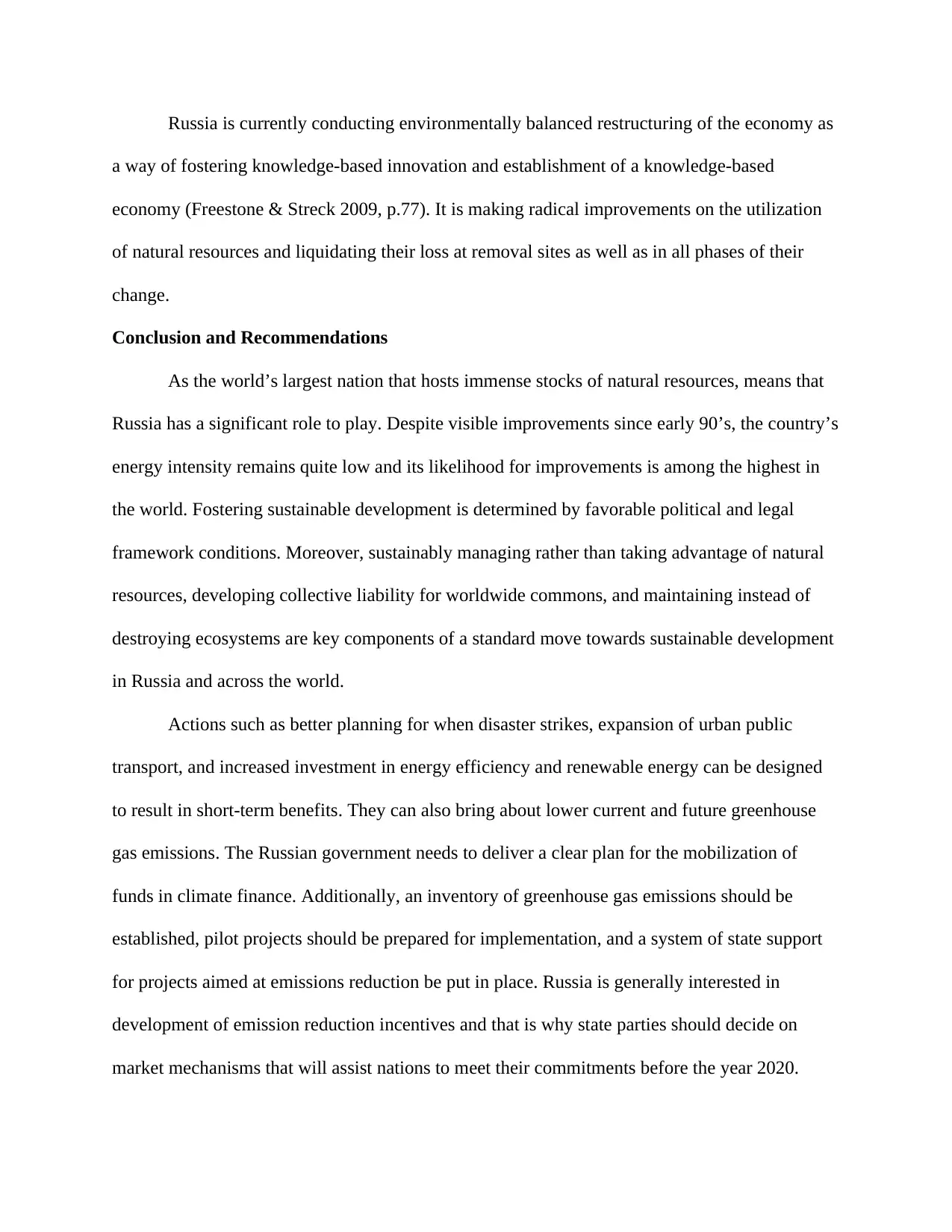
Russia is currently conducting environmentally balanced restructuring of the economy as
a way of fostering knowledge-based innovation and establishment of a knowledge-based
economy (Freestone & Streck 2009, p.77). It is making radical improvements on the utilization
of natural resources and liquidating their loss at removal sites as well as in all phases of their
change.
Conclusion and Recommendations
As the world’s largest nation that hosts immense stocks of natural resources, means that
Russia has a significant role to play. Despite visible improvements since early 90’s, the country’s
energy intensity remains quite low and its likelihood for improvements is among the highest in
the world. Fostering sustainable development is determined by favorable political and legal
framework conditions. Moreover, sustainably managing rather than taking advantage of natural
resources, developing collective liability for worldwide commons, and maintaining instead of
destroying ecosystems are key components of a standard move towards sustainable development
in Russia and across the world.
Actions such as better planning for when disaster strikes, expansion of urban public
transport, and increased investment in energy efficiency and renewable energy can be designed
to result in short-term benefits. They can also bring about lower current and future greenhouse
gas emissions. The Russian government needs to deliver a clear plan for the mobilization of
funds in climate finance. Additionally, an inventory of greenhouse gas emissions should be
established, pilot projects should be prepared for implementation, and a system of state support
for projects aimed at emissions reduction be put in place. Russia is generally interested in
development of emission reduction incentives and that is why state parties should decide on
market mechanisms that will assist nations to meet their commitments before the year 2020.
a way of fostering knowledge-based innovation and establishment of a knowledge-based
economy (Freestone & Streck 2009, p.77). It is making radical improvements on the utilization
of natural resources and liquidating their loss at removal sites as well as in all phases of their
change.
Conclusion and Recommendations
As the world’s largest nation that hosts immense stocks of natural resources, means that
Russia has a significant role to play. Despite visible improvements since early 90’s, the country’s
energy intensity remains quite low and its likelihood for improvements is among the highest in
the world. Fostering sustainable development is determined by favorable political and legal
framework conditions. Moreover, sustainably managing rather than taking advantage of natural
resources, developing collective liability for worldwide commons, and maintaining instead of
destroying ecosystems are key components of a standard move towards sustainable development
in Russia and across the world.
Actions such as better planning for when disaster strikes, expansion of urban public
transport, and increased investment in energy efficiency and renewable energy can be designed
to result in short-term benefits. They can also bring about lower current and future greenhouse
gas emissions. The Russian government needs to deliver a clear plan for the mobilization of
funds in climate finance. Additionally, an inventory of greenhouse gas emissions should be
established, pilot projects should be prepared for implementation, and a system of state support
for projects aimed at emissions reduction be put in place. Russia is generally interested in
development of emission reduction incentives and that is why state parties should decide on
market mechanisms that will assist nations to meet their commitments before the year 2020.
Paraphrase This Document
Need a fresh take? Get an instant paraphrase of this document with our AI Paraphraser
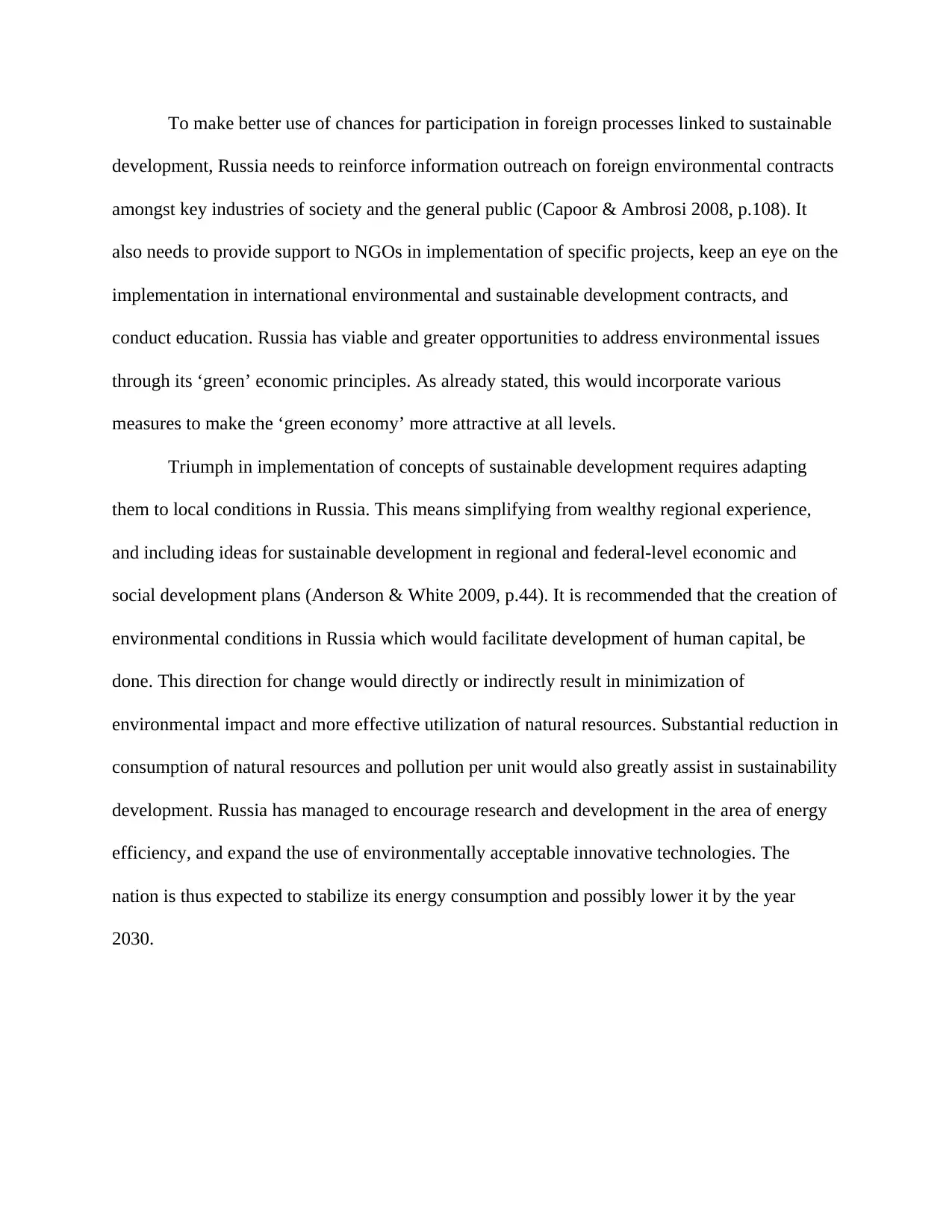
To make better use of chances for participation in foreign processes linked to sustainable
development, Russia needs to reinforce information outreach on foreign environmental contracts
amongst key industries of society and the general public (Capoor & Ambrosi 2008, p.108). It
also needs to provide support to NGOs in implementation of specific projects, keep an eye on the
implementation in international environmental and sustainable development contracts, and
conduct education. Russia has viable and greater opportunities to address environmental issues
through its ‘green’ economic principles. As already stated, this would incorporate various
measures to make the ‘green economy’ more attractive at all levels.
Triumph in implementation of concepts of sustainable development requires adapting
them to local conditions in Russia. This means simplifying from wealthy regional experience,
and including ideas for sustainable development in regional and federal-level economic and
social development plans (Anderson & White 2009, p.44). It is recommended that the creation of
environmental conditions in Russia which would facilitate development of human capital, be
done. This direction for change would directly or indirectly result in minimization of
environmental impact and more effective utilization of natural resources. Substantial reduction in
consumption of natural resources and pollution per unit would also greatly assist in sustainability
development. Russia has managed to encourage research and development in the area of energy
efficiency, and expand the use of environmentally acceptable innovative technologies. The
nation is thus expected to stabilize its energy consumption and possibly lower it by the year
2030.
development, Russia needs to reinforce information outreach on foreign environmental contracts
amongst key industries of society and the general public (Capoor & Ambrosi 2008, p.108). It
also needs to provide support to NGOs in implementation of specific projects, keep an eye on the
implementation in international environmental and sustainable development contracts, and
conduct education. Russia has viable and greater opportunities to address environmental issues
through its ‘green’ economic principles. As already stated, this would incorporate various
measures to make the ‘green economy’ more attractive at all levels.
Triumph in implementation of concepts of sustainable development requires adapting
them to local conditions in Russia. This means simplifying from wealthy regional experience,
and including ideas for sustainable development in regional and federal-level economic and
social development plans (Anderson & White 2009, p.44). It is recommended that the creation of
environmental conditions in Russia which would facilitate development of human capital, be
done. This direction for change would directly or indirectly result in minimization of
environmental impact and more effective utilization of natural resources. Substantial reduction in
consumption of natural resources and pollution per unit would also greatly assist in sustainability
development. Russia has managed to encourage research and development in the area of energy
efficiency, and expand the use of environmentally acceptable innovative technologies. The
nation is thus expected to stabilize its energy consumption and possibly lower it by the year
2030.
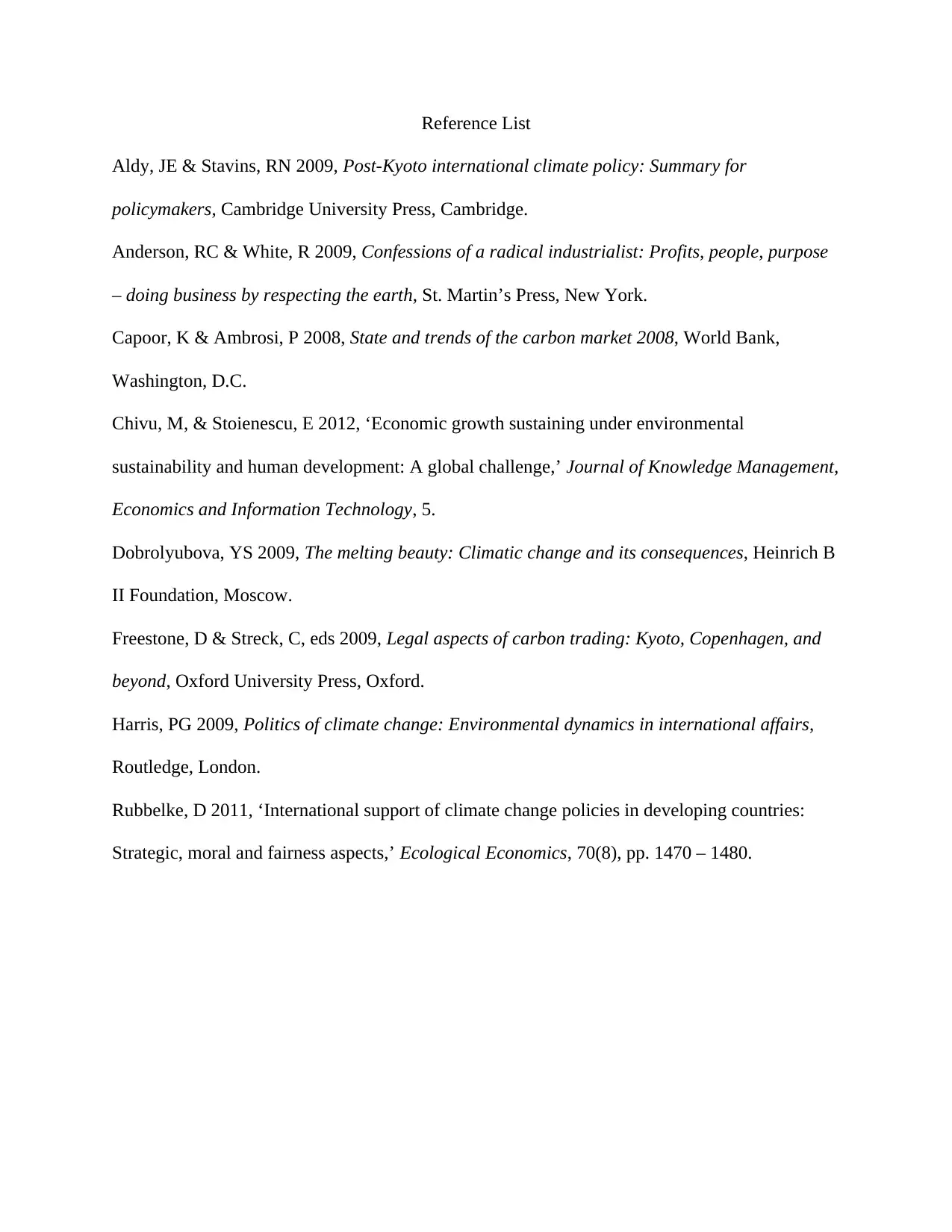
Reference List
Aldy, JE & Stavins, RN 2009, Post-Kyoto international climate policy: Summary for
policymakers, Cambridge University Press, Cambridge.
Anderson, RC & White, R 2009, Confessions of a radical industrialist: Profits, people, purpose
– doing business by respecting the earth, St. Martin’s Press, New York.
Capoor, K & Ambrosi, P 2008, State and trends of the carbon market 2008, World Bank,
Washington, D.C.
Chivu, M, & Stoienescu, E 2012, ‘Economic growth sustaining under environmental
sustainability and human development: A global challenge,’ Journal of Knowledge Management,
Economics and Information Technology, 5.
Dobrolyubova, YS 2009, The melting beauty: Climatic change and its consequences, Heinrich B
II Foundation, Moscow.
Freestone, D & Streck, C, eds 2009, Legal aspects of carbon trading: Kyoto, Copenhagen, and
beyond, Oxford University Press, Oxford.
Harris, PG 2009, Politics of climate change: Environmental dynamics in international affairs,
Routledge, London.
Rubbelke, D 2011, ‘International support of climate change policies in developing countries:
Strategic, moral and fairness aspects,’ Ecological Economics, 70(8), pp. 1470 – 1480.
Aldy, JE & Stavins, RN 2009, Post-Kyoto international climate policy: Summary for
policymakers, Cambridge University Press, Cambridge.
Anderson, RC & White, R 2009, Confessions of a radical industrialist: Profits, people, purpose
– doing business by respecting the earth, St. Martin’s Press, New York.
Capoor, K & Ambrosi, P 2008, State and trends of the carbon market 2008, World Bank,
Washington, D.C.
Chivu, M, & Stoienescu, E 2012, ‘Economic growth sustaining under environmental
sustainability and human development: A global challenge,’ Journal of Knowledge Management,
Economics and Information Technology, 5.
Dobrolyubova, YS 2009, The melting beauty: Climatic change and its consequences, Heinrich B
II Foundation, Moscow.
Freestone, D & Streck, C, eds 2009, Legal aspects of carbon trading: Kyoto, Copenhagen, and
beyond, Oxford University Press, Oxford.
Harris, PG 2009, Politics of climate change: Environmental dynamics in international affairs,
Routledge, London.
Rubbelke, D 2011, ‘International support of climate change policies in developing countries:
Strategic, moral and fairness aspects,’ Ecological Economics, 70(8), pp. 1470 – 1480.
⊘ This is a preview!⊘
Do you want full access?
Subscribe today to unlock all pages.

Trusted by 1+ million students worldwide
1 out of 12
Related Documents
Your All-in-One AI-Powered Toolkit for Academic Success.
+13062052269
info@desklib.com
Available 24*7 on WhatsApp / Email
![[object Object]](/_next/static/media/star-bottom.7253800d.svg)
Unlock your academic potential
Copyright © 2020–2026 A2Z Services. All Rights Reserved. Developed and managed by ZUCOL.





